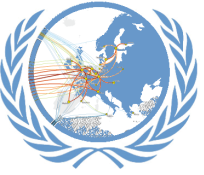Web 2.5: Is it time we elected an Internet government?


The BBC are reporting that the Great Firewall of China - which limits certain websites, domains and networks - has limited access to Twitter, in an attempt to curb Chinese citizens from sharing their experiences to the wider world.
On a similar note, in Iran the diplomatic efforts to sustain order after the controversial presidential elections last month are slowly having effect. With the lifting of certain measures such as the restrictions on text messaging and Internet access, it appears (at least from the perspective of Western media) that things are returning to normal in the region.
Shappi Khorsandi, an Iranian comedian who became a British refuge "before it became popular" often runs with this running joke:
"The Iranian regime strongly advocates freedom of speech - there's just no freedom after you've spoken."
This isn't a soapbox to criticise Iran. As a nation, the people are beautiful, peaceful people who have been turned sour by a regime which oppresses the people -- as we have seen in recent times thanks to Iranians using citizen journalism and posting videos to YouTube. A similar perspective in China has been broadcast through user-submitted videos showing almost an embarrassment of their own nations and governments in their reactions and responses. These are citizens working against the law, facing imprisonment and inhumane punishments to stand up for their own in-built human rights - a genetic survival instinct kicking in.
The Internet is being used as a means to support each individual's right to freedom of speech. The boundary of what is politically active speech and bordering hate speech is not clear. Nevertheless, it is generally considered the West's opinion that the Internet is used to express ourselves and our opinions. Other nations and cultures disagree. That is, however, their prerogative and we shouldn't necessarily criticise that.
This did get me thinking though...
Jason Hiner, editor-in-chief of ZDNet's sister site TechRepublic, is getting the hang of this. Using a democratic system, he is asking the readers to vote in a "President of the Internet" in a mock-election. Take this:
- if the Internet were a nation, it would have over one billion citizens in total.
- if Facebook were a nation, it would have over 240 million - add in the UK and Portugal to the map and you'll have your visual representation.
In online criminal investigations, the laws which govern some territories of the world differ greatly to those governing other territories. Take online child abuse imagery, or terrorist handbooks such as the "Anarchist's Cookbook"; searching for these online is illegal in the UK and US, whereas other countries permit these searches, often due to cultural differences.
When sharing intelligence and engaging in online legal co-operation between Commonwealth countries, it's not so bad - there's often no language barrier and due to the country's legal setup, they're often very similar to each other. Legal processes aren't necessarily in line with one another but they are aligned to a point where it is relatively easy to share information. When it's between the US and the UK, for example, sharing information isn't very easy. "Special relationship"? What special relationship? There isn't one on the legal front; just one in a diplomatic sense.
In 2005, a bright spark from CNET had a similar idea. Declan McCullagh suggested the idea that the United Nations (UN) could "run" the Internet. It's an interesting idea to have an elected representative from each nation to participate in discussion, in engaging a process which creates a diplomatic "standard" for the web worldwide. If you can search for the Dalai Lama in Brazil, you should be able to search for the Dalai Lama in China; no exceptions.
In a similar process to the Kyoto protocol, an international agreement between a number of major carbon-emitting nations to reduce the effects of climate change, an international agreement of Internet standards could be introduced. While agreements can be broken if necessary, such as the agreement mentioned in my recent article in regards to EU phone chargers, ratified legislation could bring together a worldwide protocol for managing web-based events, legal processes and channels, and standards as to what can and can't be broadcast. This could be one step closer in gaining control of the online piracy index which threatens the livelihood of individuals and organisations who create software.
If this were the case, an international law of communications could be established by a "government" made up of representatives of every country, similar to the United Nations, to discuss and agree on universal standards to ensure inter-continental co-operation in dealing with consumer and corporate online law breakers. No longer will individual countries have censorship laws and web policies. Instead it would be moulded into a giant set of international laws which governed the entire web as the first online nation.
Regardless of where you are in the physical world, if you are online, you stick to one set of international rules. A simple idea, in theory.
For now, the web is being used as a weapon for the case of democracy and those living in non-democratic circumstances are struggling to make themselves heard. If the web is to progress to the next level - "Web 3.0" and truly interactive services bridging the online and offline world - there needs to be some basic level of international collaboration on the legal and diplomatic front. To reach "Web 3.0", the idea behind a governed Internet, "Web 2.5", may need to be taken into serious consideration.
Can we really progress to the "next level" with what we already have in place? Really think about it, then let me know.